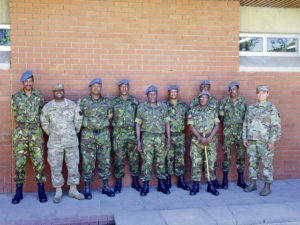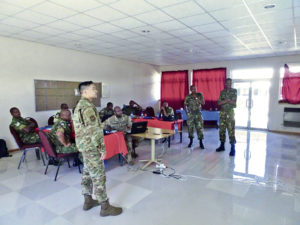
When Airmen hear of an enlisted professional military education school, they typically think of an Air Force-only school with a narrow mission scope.
However, according to the Kisling Noncommissioned Officer Academy’s website, the mission is not only “to prepare junior enlisted leaders to be adaptable for current and future leadership and management challenges in order to operate critically in complex and ambiguous environments,” but to bring their curriculum to joint and combined environments.
“When you hear ‘Kisling NCOA,’ you immediately think of U.S. Air Forces in Europe-wide students at a centralized location but we do way more than that,” said Master Sgt. Justin Luna, Kisling NCOA director of education. “We actually go to different countries and different countries come here. We have international students and students from different branches of services. We are more than what is physically here.”
Kisling NCOA isn’t limited to just USAFE students, it also extends to Air Forces Africa as part of the African Military Education Program.
AMEP aims to professionalize African militaries by helping them to develop faculties and curriculums for African professional military education institutions.
“This is a continuing effort and not a one-time thing,” said Chief Master Sgt. Terrance Smiley, Kisling NCOA commandant. “There are multiple events looking to professionally develop other armed forces so they can mimic what we are doing from an NCO academy perspective and educational aspect in their respective militaries.”
The AMEP is often a two-year program with multiple events ranging from 16, 18 or 24 events in total.

Since late 2018, the Kisling NCOA has been partnering with the Botswana air arm to help stand up their first NCOA.
“We go there, they come here and we teach them how to be instructors,” said Tech. Sgt. Ruben Pineda, Kisling NCOA instructor. “We are helping them build their school house, lesson plans, curriculum writing and instructor delivery.”
In order to help the Botswana air arm, Kisling instructors spend time in Germany and Botswana with the initial four instructor cadre.
“We are halfway between our 10-visit program. For the next iteration, they will be shadowing our instructors on how to be instructors themselves,” Pineda said. “Two of the four instructors have attended our NCOA course at Lackland Air Force Base, Texas. So, they know what it’s like to be a student in the classroom but never have actually facilitated a course, seeing behind the scenes and learning what it takes to be an instructor.”
Once the initial cadre is trained, the Kisling NCOA instructors will travel back to Botswana and watch the cadre deliver the lessons they created.
“We are going to watch, assess and provide feedback. The curriculum is going to be based off of their needs and their culture,” Pineda said. “Eventually, we want to give them a completed product, a product they can deliver once they open up their school house.”
Currently, AMEP has 16 African countries with active partnerships and Kisling NCOA will continue to do its part to ensure that each country’s enlisted force is professionally developed.
“The noncommissioned officer corps is the backbone of any military,” said Chief Master Sgt. Ramon Colon-Lopez, former U.S. Africa Command senior enlisted leader, to an auditorium full of Ghana Armed Forces soldiers during a 2018 visit to Ghana. “If you have an effective NCO corps, you will automatically have an effective and efficient armed force.”


